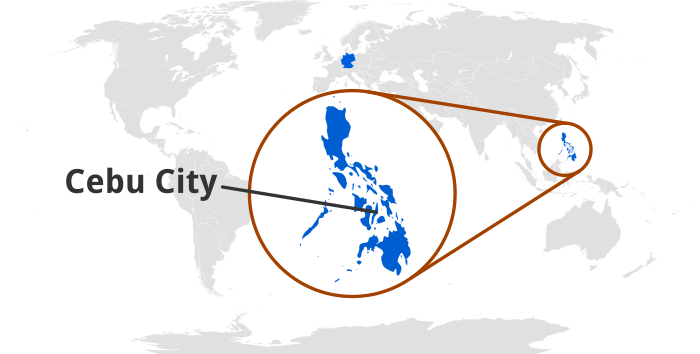Our mission
„Give a man a fish, and you feed him for a day. Teach a man to fish, and you feed him for a lifetime.“
GGAP's mission is to provide young people on the Philippines with a way out of poverty. Self-empowerment and sustainability are our key objectives.

Philippines
With an ever growing population (currently c. 107 million), the Philippines are the fastest growing country in Southern Asia. The Philippines are also one of the poorest countries in that region. Many people to not have education, are unemployed, are lacking a perspective for their future. Young people leave their rural villages to seek a better future in the cities and end up in large slums, working as day laborers.
(Suba) Pasil, Cebu City
GGAP started in the slums of (Suba) Pasil near the port of Cebu City. People live in brittle sheds. Waste water flows in the roads. Children who grow up here are doomed to live a life in poverty.
We enable the poorest of the poor to get educated
Education and vocational training are the basis for individual development.
Eduation is key for disease prevention, it is key to fight poverty, it is key for the development of societies.
Education lets people participate in their society and removes them from the grasp of crime, fanaticism, and terrorism.
Our local partners
We work with Don Bosco training centers that offer vocational training in a variety of jobs.
Don Bosco centers are run by the Salesians, a Christian institute that was founded by Italian priest Don Bosco in 1859.
We cooperate with the following vocational training centers:
- (Suba) Pasil (Cebu City)
- Punta Princesa (Cebu City)
- Balamban (on the West coast of the isle of Cebu)
- Mati City (Davao Oriental/Mindanao)
- Liloan (north of Cebu City)
- Minglanilla (south of Cebu City)
- Dumangas
Education is an opportunity
A vocational training at the Don Bosco centers costs between 300 and 400 Euros (or 300-400 USD), including board and lodge for the duration of the course. This is not a lot of money for a person in Western societies, but it may change the life of a young man or woman on the Philippines to the better.
We currently sponsor the following trainings: car mechanics, carpentry, machine engineering, electrical engineering, and welding. These practical jobs are sought after on the Philippines, and unlike academic education, there is little "brain drain" to foreign countries (such as the USA).
We award scholarships according to financial need, but also personal talent and engagement. We take the family background into account. Women are given priority.
Sustainability
Our aim is to make it easier and more amenable for poor young people to remain in their homeland. We do not want the Philippines to lose their most important resource: Educated young people. Therefore we sponsor vocational trainings that enable the young to live and work where they grew up.